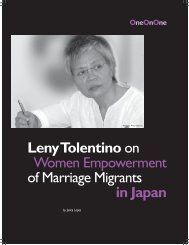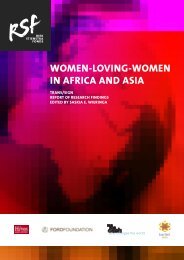Ecology: Linking - Isis International Manila
Ecology: Linking - Isis International Manila
Ecology: Linking - Isis International Manila
Create successful ePaper yourself
Turn your PDF publications into a flip-book with our unique Google optimized e-Paper software.
i<br />
Green Belt Movement<br />
The Green Belt<br />
Movement is one of the<br />
most prominent<br />
women’s civil society<br />
organisations, based in<br />
Kenya, advocating for<br />
human rights and<br />
supporting good<br />
governance and<br />
peaceful democratic<br />
change through the<br />
protection of the<br />
environment and to<br />
promote good<br />
governance and culture<br />
of peace.<br />
Source: http://greenbelt.org<br />
WIA: Who are the feminists, actors or<br />
organisations that are in the forefront of the<br />
feminist political ecology framework?<br />
Yvonne: In the academic field of<br />
geography, Diane Rocheleau’s work<br />
provides the most obvious starting point<br />
for critical analysis. Wendy Harcourt and<br />
Arturo Escobar’s edited book, Women and<br />
the Politics of Place, also provides insights<br />
into a revised feminist political ecology<br />
by framing debates as “women and the<br />
politics of place.” While politically<br />
nuanced, the “ecological” angle is getting<br />
greater attention from other scholar<br />
activists such as Marsha Darling.<br />
Organisations that are at the forefront<br />
of this framework are sure to include<br />
an array of local and probably mostly<br />
undocumented movements operating in<br />
defense of their access to local<br />
resources necessary for continued<br />
livelihoods. This may not involve high<br />
profile challenges and movements like<br />
the Green Belt Movement, but many<br />
women collectively resist in defense of<br />
the resources that underpin their<br />
livelihoods. While their activities may not<br />
span the range of geographic scales<br />
usually associated with political ecology<br />
studies, their activities constitute a<br />
feminist political ecology because the link<br />
between local ecological process are<br />
clearly connected to the political<br />
practices of access to and use of<br />
resources. Such local action and their<br />
associated meanings are often invisible<br />
yet my experience in the Pacific is that<br />
such actions are ubiquitous.<br />
WIA: How do women mobilise and<br />
strategise using the feminist political ecology<br />
framework in addressing specific concerns,<br />
e.g., agriculture, mining, land rights, etc.?<br />
Yvonne: I suggest that women on the<br />
ground rarely use an explicit political<br />
ecology framework as mapped out by<br />
activist academics. Rather, the latter are<br />
learning from actions on the ground to<br />
inform and influence political actions<br />
at national and international arenas. A<br />
huge challenge is to resist the tendency<br />
to suppress the gendered nature of an<br />
explicit feminist engagement that<br />
routinely happens as women underplay<br />
their own needs for the sake of the<br />
“common good.”<br />
WIA: Using the framework, how could the<br />
feminist movements strengthen their advocacy<br />
towards gender, development and the<br />
environment, at the local, national, regional<br />
and international levels?<br />
Yvonne: A key feature of political<br />
ecology is the integration of scales of<br />
analysis from the local to the internal<br />
regional, national, regional and<br />
international. By systematically mapping<br />
out the policy connections at these various<br />
geographical scales, and taking into<br />
account the various embodied practices<br />
on One<br />
14<br />
One






